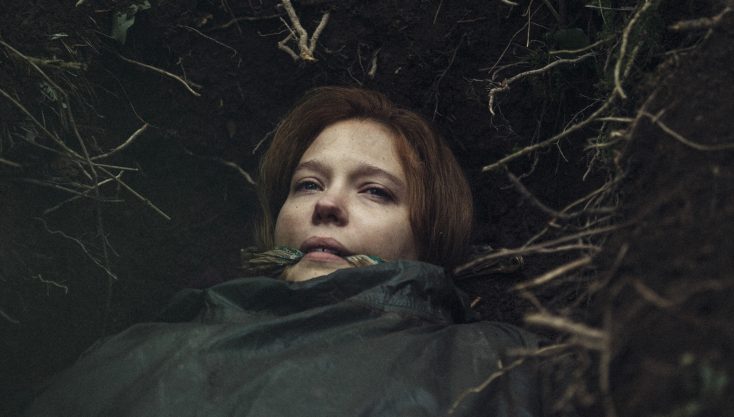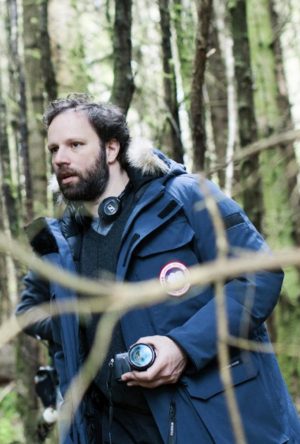By ANGELA DAWSON
Front Row Features
HOLLYWOOD—Greek filmmaker Yorgos Lanthimos (Oscar nominated “Dogtooth”) makes his English-language feature debut with the offbeat dystopian dramedy “The Lobster.” The film, which won last year’s Jury Prize at Cannes, tells the metaphorical story about how humans are subject to rigid societal rules, be it relationships or something else.
Hollywood leading man Colin Farrell (“Tigerland,” “In Bruges”) plays a paunchy mustachioed middle-aged man named David whose wife has abandoned him and, under the rules of the society he lives in, he has just 45 days to connect with another partner or get transformed into an animal of his choosing to be left in the woods to suffer whatever fate awaits. David checks into a mysterious hotel where he meets other singles facing the same critical deadline. As anyone knows, finding true love isn’t easy, and is particularly challenging when faced with—literally—a life or death outcome.
Naturally, David’s thoughts turn toward escape and, with a little help from a sympathetic hotel insider, he manages to flee the compound only to run smack dab into a rebel group of loners with their own list of harsh rules prohibiting romantic entanglements. It’s not hard to figure out what happens next.
The all-star cast includes Rachel Weisz, Olivia Colman, Lea Seydoux, John C. Reilly, Ben Whishaw and Ariane Labed.
Lanthimos, who now makes his home in England, spoke about making his offbeat satire, casting Farrell, who gained 40 pounds for the role, and delivering an ending that’s open to individual interpretation.
Q: What was the inspiration for “The Lobster?”
Lanthimos: It’s usually a long process so it’s hard to answer the question exactly where it comes from. What I do is work closely with a friend of mine Efthimis Filippou. We’ve co-written my last three films. So every time we finish a film we start discussing what we’ll film next. We just start discussing things we’ve observed around us or situations. Those form into an idea or condition that feels interesting to explore and then that becomes a little story, and then we start writing scenes about this story. It just progresses like that. When we feel comfortable that it’s something we’re interested in then we try to write the whole screenplay.
Q: What were the biggest challenges in making it?
Lanthimos: We were trying to create a bigger world. There was a larger scale necessary to achieve. Making these films that don’t fit into a box, it’s hard to communicate to people and hard to convince people to invest in them. That part of the process was definitely hard. It ended up being a multi-party European production and that was how we made the film. From making small films in Greece with my friends and having them offering their services and belongings to make the films and moving into a proper film structure and industry, meant that I had to work like the characters in the film, under very specific rules. So it wasn’t as flexible as when I was making films with my friends. That was a little difficult for me to get used to. On the other hand, there were a lot of benefits coming from it where I was able to work with more means in order to achieve what we were trying to achieve and I was able to work with actors who are very committed and supportive. Subsequently, trying to create this world with a limited budget posed many difficulties so we just tried to do the best we could.
Q: Both the hotel and the loners in the woods have rules that make it difficult to abide by. Could you talk about that?
Lanthimos: The irony in it is that there is not so much contrast. What I was interested in was showing the irony of a character that escapes from one system believing that he could be freer in a different system. The loners are supposedly free because they’re going against the system but the irony is in order to create this other system they have to have their own rules as well. So it ends up being very similar. Although the rules are antithetical, they end up being similarly oppressive as the rules in the rest of the world we’ve created. I think it poses questions about whether you are free to think the way you want, whether you are free to feel the way you want and other questions like that.
Q: How did you cast Colin Farrell as your protagonist?
Lanthimos: I’ve always liked Colin. I was thinking an actor that can be great in films like “In Bruges” to “The New World” to “Total Recall” definitely has a range. You can work with him and do great things. I also like to watch interviews with actors when I’m casting to get a sense of who they are apart from watching them in films. I saw that he has all these different qualities and that he would be someone that would enrich the character. I saw that he was smart and had a great sense of humor. He can be very charming but awkward at times. So I thought all these qualities would bring a lot to the character.
Q: Did you ask him to put on the weight?
Lanthimos: I did. It was very early on. We discussed it the first time we spoke. We met on Skype and didn’t have much to talk about because I don’t like discussing the screenplay too much. I don’t like discussing the characters or their background. So we just talked more about practical things. He asked me, “What do you think (David) looks like?” And I told him I thought he’d be slightly softer and someone who has lived a life for a long time with his wife and was comfortable, and didn’t take too much care of himself. And he said, “I think he could be very thin.” (He laughs.) He was trying to avoid putting on weight, I think. I said I thought if he was extremely thin then that would make him much more miserable and depressive as a character. And then he said, “I know what you mean. I just thought it would be easier to lose weight than to gain it.” And he just did it.
Q: What was your most memorable moment from the film?
Lanthimos: I don’t know; I was just so stressed all of the time. I was having a nervous breakdown but it’s always like that for me. I remember having some fun because we had to make this film and everybody had to believe in the world, take (the bizarreness) for granted. So the actors were saying what they did without judging it. We took it literally in a way. Sometimes you stood back and said, “What are we doing?” We had camels walking around. There were instances where you laughed about the situation. We did improvisation. It was funny seeing them accepting the world.
Q: Did you intentionally plan to make the ending ambiguous?
Lanthimos: That was the purpose exactly. We’re trying to make it ambiguous. We expect people to see different things in it. You can tell things about people according to the way people think it ends—whether you’re an optimist or pessimist or if you believe in love or if you’re cynical. It’s up to each viewer.






